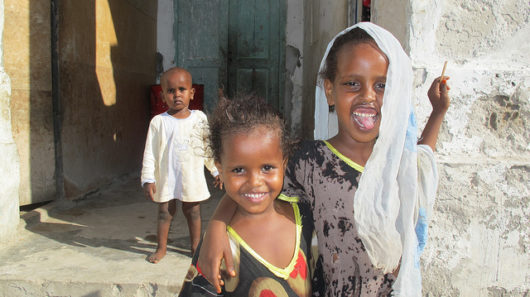Immunization Programs Bring Benefits to Africa

Globally, more than 2 million children are saved every year by immunizations. In Africa, the success of programs for immunization plays a significant role in world health. Immunization programs bring benefits to Africa and other countries around the world by reducing, containing and eliminating life-threatening diseases.
Successful Immunization Program
The Expanded Programme on Immunization (EPI) is responsible for most of the vaccinations in Africa. EPI focuses its attention on immunizing children against six life-threatening diseases: diphtheria, pertussis, tetanus, tuberculosis, polio and measles.
EPI has been acknowledged for maintaining control over many infectious diseases, showing significant progress since its initiation in 1974. For instance, EPI is credited for being on the forefront of eradicating smallpox. The eradication of the polio-virus is currently underway. This disease was responsible for infecting and killing millions of children previous to EPI. After the launch of EPI, enormous reductions of paralysis caused by polio was observed due to polio immunization.
Eradication and Vaccination
In 2017, the required three doses of the polio vaccine were successfully distributed to 85 percent of newborns around the world. With the exception of Afghanistan, Nigeria and Pakistan, polio has been eradicated in almost every country, according to The World Health Organization.
Measles vaccinations have been a huge success as well. In 2015, about 85 percent of children around the world, including Africa, have been immunized with the measles vaccine. In 2017, 167 countries had received two doses of the measles vaccine. Since 2000, more than 20 million lives worldwide have been saved through measles immunization.
MenAfriVac, the first vaccine created specifically for Africa, is a vaccine for adults and children (9 months to 29 years old) that protects them from group A Meningitis. More than 270 million people have been immunized, and cases due to the type A bacterium have declined 99 percent in areas that obtained full vaccinations. It is predicted that more than 400 million people will be vaccinated with MenAfriVac in fewer than two years. This can prevent over 150,000 deaths.
Immunization programs are making huge changes for better healthcare. Immunization coverage in Africa has advanced since the start of EPI, which has helped increase the needed dosages of DPT3 (a vaccine that shields diphtheria, pertussis and tetanus) for children. In 2017, DPT3 had reached as high as 90 percent in 123 countries.
The Economic Impact of Vaccinations
Vaccines also have a strong economic impact on people. “A healthy child is more likely to go to school and become a more productive member of society in later life while their families can avoid the often crippling healthcare costs that diseases can bring” explained Dr. Seth Berkley, CEO of a vaccine alliance (GAVI). “[…] this is enough to save millions of people from the misery of extreme poverty. [..] we now need to redouble our efforts to ensure every child, no matter where they’re born has access to lifesaving vaccines.”
Not only are families saved undo economic hardship thanks to vaccines but also governments save money through ensuring a healthier population. On average, $16 is saved for every $1 that is spent on vaccinations. This can be due to the money that would be lost from missing work, healthcare costs and lower productivity due to illness.
Other Immunization Programs
There are many other programs like EPI that are aiming to make a difference such as The Global Immunization Vision and Strategy (GIVS), The Sustainable Development Goals (SDGs), and The Global Vaccine Action Plan (GVAP). Programs such as these are continuing to help Africa in powerful ways.
Although these developments have been successful, 1 in 5 children still will not get the vaccines needed to prevent life-threatening diseases. Immunization coverage in Africa is still below the goal of 90 percent, leaving many people without vaccines.
The need for extending immunization to everyone is extremely high, and a plan is currently in place through The Global Vaccine Action Plan (GVAP) to continue to achieve the goal. GVAP has set six principles to elaborate on the plan in order for it to be achieved by 2020, saving millions of lives. These principles include partnership, country ownership, equity, integration, sustainability and innovation.
Hope
To help GVAP achieve their goals, each region has developed their own plan in order to ensure that every child will be immunized and protected from deadly viruses. If this plan works out, all communities will have access to life-saving vaccines.
Vaccinations meet the needs to care for weaker societies by enabling good public health, which helps in reducing poverty. Immunization programs bring benefits to Africa as well as saving millions of people in need of vaccines. Challenges are still faced but hope continues.
– Kathleen Smith
Photo: Flickr
